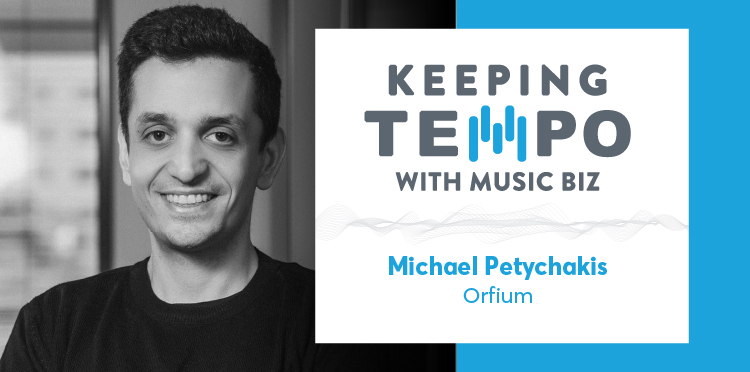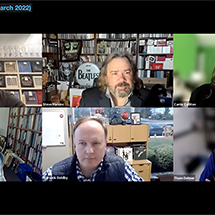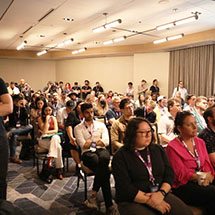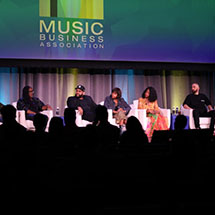
[KEEPING TEMPO WITH MUSIC BIZ] It AIn’t All Bad: It’s Time To Give AI Its Due — Op-Ed by Orfium’s Michael Petychakis

A turbulent journey of love and hate best describes the relationship between music and technology over the years. But the reality is that technology is critical to the more recent and long-term future success of the music industry; they are inextricably linked. I include Artificial Intelligence (AI) in that.
Upon its launch in late 2022, OpenAI’s ChatGPT democratized access to a powerful generative AI tool, sparking a now familiar debate around copyright protection and highlighting the pressing need for legislation to define the boundaries of AI in music creation.
Frustratingly this debate, while important, has overshadowed the incredible benefits AI can bring to the music industry.
Entertainment and music data specialist Luminate, in its 2023 Year-End Music Report, reported that global total on-demand streaming (audio and video) grew by 33.7% in 2023, to a record 7.1 trillion streams. This is against a buoyant industry backdrop, with the IFPI (International Federation of the Phonographic Industry) revealing that 2022 marked the eighth consecutive year of growth in the global music market, yielding $26.2 billion in revenue.
With this exponential growth, how can we guarantee that creators know where and how their music is being used and that they are being properly remunerated?
Spoiler alert: AI.
Technological Challenges Demand Technological Solutions
In an industry poised to break $150 billion by 2030, as projected by Goldman Sachs, and with a proliferation of new channels & platforms including the Metaverse and Web3, efficient monetization is one of the biggest challenges for the music business today.
With the availability of such diverse music distribution and consumption methods, and in an industry built on structures that are hundreds of years old, the mechanisms to ensure rightful compensation for the use of music have grown increasingly inefficient. Technological challenges demand technological solutions.
For example, a substantial portion of the music streaming ecosystem is fuelled by user-generated content (UGC), a sector expected to soar to $71.3 billion by 2031 according to Allied Market Research. Leading this surge are digital platforms like Instagram, Meta, TikTok, Twitch, and YouTube. However, artists, composers, songwriters and other rightsholders find themselves grappling with limited time and insufficient infrastructure and technological capabilities, which hinder their ability to effectively track and monitor the vast volume of music used across social media and other digital applications.
Added to these challenges, digital and social media platforms often rely on outdated and inefficient methods to attribute music ownership and monitor its usage, hampered by incomplete metadata and obsolete Content ID systems.
Accurate and comprehensive metadata is fundamental to driving discoverability, usage and, ultimately, revenue from music on UGC platforms. But with an avalanche of user-generated video content being uploaded daily on platforms like YouTube, often lacking the correct metadata, a black hole emerges, sucking in unattributed income that should be paid out to artists and rightsholders. An impossible challenge to meet manually. Enter AI.
AI The Good Guy
Through machine learning, AI has already been working for many years, helping creators claim their income from digital platforms and supporting the fight against piracy.
At Orfium, we have been harnessing the power of AI since we launched in 2015, integrating it into our technology to help track, identify and report music usage across broadcast and UGC platforms, ultimately delivering income to creators and rightsholders. In 2023, we processed over 21 million claims, unlocking UGC revenue that, without the automation provided by AI, could otherwise have been left unclaimed.
Our AI-based technology enhances metadata quality by automatically tagging large catalogues within seconds. It tracks, matches, and claims revenue for our partners’ and clients’ copyrights in UGC, ensuring that when artists’ and songwriters’ songs feature on platforms like YouTube, they are rightfully compensated.
This involves regularly cataloguing [up to 40] million lines of data, using our AI-powered software to compare our information against those shared by UGC which enables us to optimize claims on music at scale by detecting specific language in music videos, segments of music in long-form videos, cover versions of songs, or sonic similarities.
The entire process takes just eight hours.
And it’s only possible with the application of machine learning technology.
AI is radically transforming the rights management landscape, offering groundbreaking solutions that address some of the music industry’s most difficult challenges related to metadata management and revenue optimization on global digital platforms.
As AI technology becomes an integral part of our lives, it is imperative for major players in the music industry to embrace it as a power for good. By doing so, they can fully harness the opportunities it offers for music creation and monetization, helping our industry reach its true potential.
By: Michael Petychakis, Chief Technology Officer at Orfium
You can read past “Keeping Tempo” articles via the portal linked here. And, stay tuned for more insightful discussions from our members and partners from across the industry!












